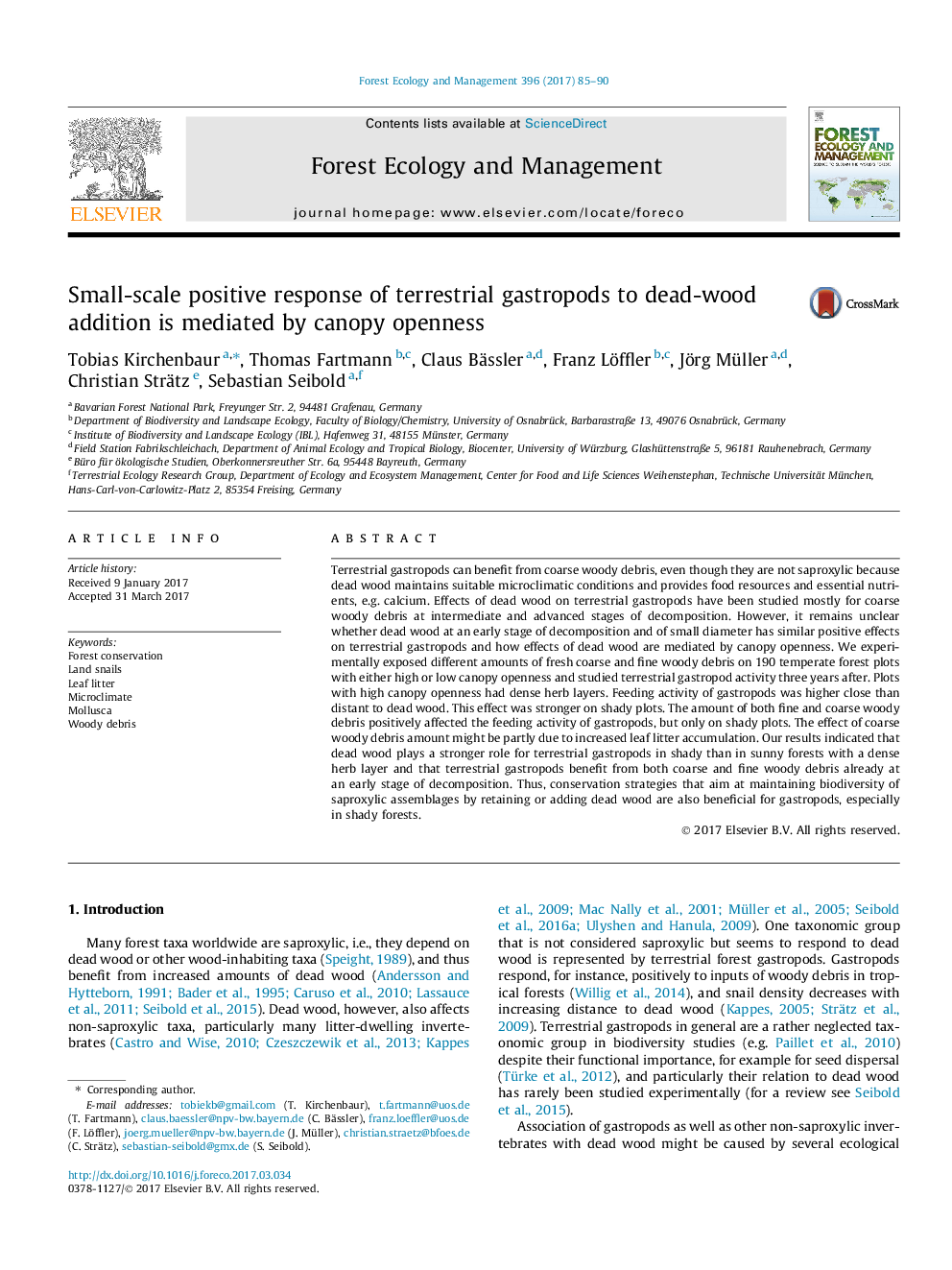| کد مقاله | کد نشریه | سال انتشار | مقاله انگلیسی | نسخه تمام متن |
|---|---|---|---|---|
| 4759418 | 1421362 | 2017 | 6 صفحه PDF | دانلود رایگان |
عنوان انگلیسی مقاله ISI
Small-scale positive response of terrestrial gastropods to dead-wood addition is mediated by canopy openness
ترجمه فارسی عنوان
واکنش مثبت واکنشی مثبت از گاستروپاهای زمینی به افزودن چوب مرطوب به وسیله باز شدن قوچ می شود
دانلود مقاله + سفارش ترجمه
دانلود مقاله ISI انگلیسی
رایگان برای ایرانیان
کلمات کلیدی
ترجمه چکیده
گاسترودهای زمینی می توانند از آوارهای چوبی خیلی خوب بهره مند شوند، هرچند که آنها سابروکسیلی نیستند، زیرا چوب مرده شرایط مناسبی را برای خنک کننده ایجاد می کند و منابع غذایی و مواد مغذی ضروری را فراهم می کند. کلسیم اثرات چوب مرده بر گاستروپود های زمینی بیشتر مورد مطالعه قرار گرفته است. با این وجود، هنوز مشخص نیست که آیا چوب مرده در مرحله اولیه تجزیه و قطر کوچک اثرات مثبت و مشابهی بر بلایای زمینی دارد و اینکه چگونه اثرات چوب مرده با باز شدن کاناپه میانه روانه می شود. ما آزمایشگاهی مقدار های زیادی از باقلا سبز درشت و درشت چوبی را در 190 توده جنگل معتدل با باز بودن کاناپه بالا یا پایین کشف کردیم و سه سال بعد از فعالیت زمینی گاستروپود مورد مطالعه قرار گرفت. توطئه های با باز بودن بالای سایبان دارای لایه های گیاهی متراکم بود. فعالیت تغذیه گاستروپود ها نزدیکتر از فاصله دور به چوب مرده بود. این اثر بر روی تکه های سایه ای قوی تر بود. مقدار هر دو ضایعات چوب ریز و زیبا به طور مثبتی بر فعالیت تغذیه گوشت خوک ها تأثیر می گذارد، اما تنها بر روی اجزای سایه دار تاثیر می گذارد. تاثیر مقدار آوار درشت چوبی ممکن است به دلیل افزایش انبساط بستر برگ باشد. نتایج ما نشان داد که چوب مرده نقش مهمی را برای گاستروپود های زمینی در سایه ها دارد، از جمله در جنگل های آفتابی با یک لایه گیاهی متراکم و جلبک های زمینی از زباله های چوب و درشتی که در حال حاضر در مرحله اولیه تجزیه هستند، بهره مند می شوند. بنابراین، استراتژی های حفاظت که هدف حفظ تنوع زیستی مجموعه های سابرولیس با حفظ یا اضافه کردن چوب مرده نیز برای گاستروپودها، به ویژه در جنگل های سایه دار، مفید است.
موضوعات مرتبط
علوم زیستی و بیوفناوری
علوم کشاورزی و بیولوژیک
بوم شناسی، تکامل، رفتار و سامانه شناسی
چکیده انگلیسی
Terrestrial gastropods can benefit from coarse woody debris, even though they are not saproxylic because dead wood maintains suitable microclimatic conditions and provides food resources and essential nutrients, e.g. calcium. Effects of dead wood on terrestrial gastropods have been studied mostly for coarse woody debris at intermediate and advanced stages of decomposition. However, it remains unclear whether dead wood at an early stage of decomposition and of small diameter has similar positive effects on terrestrial gastropods and how effects of dead wood are mediated by canopy openness. We experimentally exposed different amounts of fresh coarse and fine woody debris on 190 temperate forest plots with either high or low canopy openness and studied terrestrial gastropod activity three years after. Plots with high canopy openness had dense herb layers. Feeding activity of gastropods was higher close than distant to dead wood. This effect was stronger on shady plots. The amount of both fine and coarse woody debris positively affected the feeding activity of gastropods, but only on shady plots. The effect of coarse woody debris amount might be partly due to increased leaf litter accumulation. Our results indicated that dead wood plays a stronger role for terrestrial gastropods in shady than in sunny forests with a dense herb layer and that terrestrial gastropods benefit from both coarse and fine woody debris already at an early stage of decomposition. Thus, conservation strategies that aim at maintaining biodiversity of saproxylic assemblages by retaining or adding dead wood are also beneficial for gastropods, especially in shady forests.
ناشر
Database: Elsevier - ScienceDirect (ساینس دایرکت)
Journal: Forest Ecology and Management - Volume 396, 15 July 2017, Pages 85-90
Journal: Forest Ecology and Management - Volume 396, 15 July 2017, Pages 85-90
نویسندگان
Tobias Kirchenbaur, Thomas Fartmann, Claus Bässler, Franz Löffler, Jörg Müller, Christian Strätz, Sebastian Seibold,
